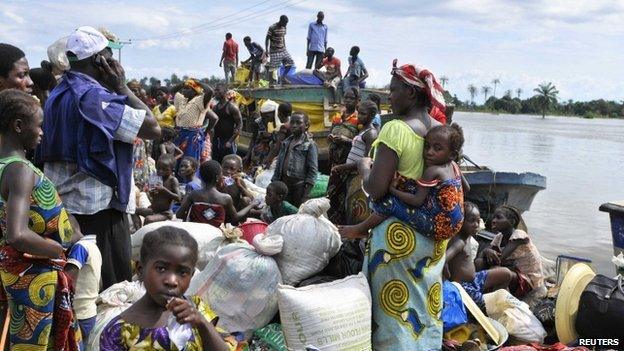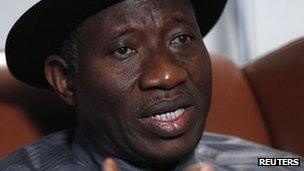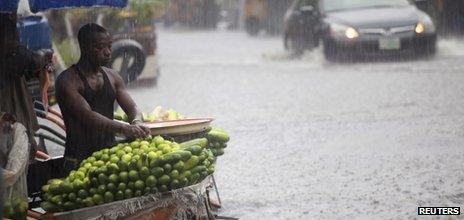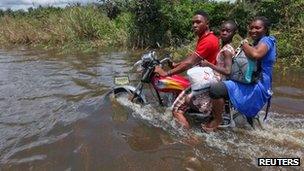African viewpoint: Nigeria's water woes
- Published
- comments

In our series of viewpoints from African journalists, Sola Odunfa in Lagos considers the torrent of problems facing Nigeria's president.
The look I have been seeing on Nigerian President Goodluck Jonathan's face in newspapers and on television these last few weeks is enough evidence of the very serious trouble he is grappling with both privately and officially.
The skin on his face and neck is drawn.
His eyes have lost the sparkle which was a big asset at last year's presidential election.
Even when he manages to put on a smile it sticks out a mile that it is fake.

Has Goodluck Jonathan lost his sparkle?
The man seems to have aged suddenly.
Who would not in his shoes?
His wife Patience, who returned home from Germany a few days ago, had been in hospital for more than four weeks for an ailment which has so far not been disclosed to Nigerians who, I believe, were paying the bill.
Except for two fleeting visits, Mr Jonathan was unable to play the caring husband at Patience's bedside as, I am sure, he would have liked to do.
Midnight oil
Meanwhile Islamist insurgents are throwing bombs and firing Kalashnikovs with dastardly effects all over northern Nigeria every day to ensure that the president does not sleep.
Down south criminal youths are on an intensifying spree of kidnapping for ransom.
The army and police are stretched thin.
Many officials who should be seen burning the midnight oil - literally as there is no electricity - devising strategies to assist the president are instead spending their time devising new strategies to steal public funds.

Much of next year's harvest has been destroyed by the floods
Now the mother of all problems has landed on the president's weakening shoulders: Water, water, water in furious torrents wreaking death and destruction across the country.
The floods are of such magnitude that they stretch for several miles in width and are unstoppable in their flow, submerging whole towns and villages from the north-east near the Cameroon border through the central region down to the south-eastern coastal states.
Meteorology officials say it is the worst in Nigeria for 50 years.
According to official accounts at least 200 people have died - and the count is still on - more than a million others have been made homeless and hundreds of thousands of hectares of farmland have been destroyed.
An overwhelmed president said earlier this month on a visit to some of the camps set up for displaced people that this was "a national disaster".
A disaster indeed for the picture on the horizon is gloomy with a food crisis of epic proportions and massive homelessness.
The food basket of the nation has been devastated by the floods, resulting in the destruction of most of this year's food crop harvest.

Many regions of Nigeria have been affected by the floods
Yams, beans, maize and more - all gone, bringing the spectre of massive food imports next year.
At another level, various agencies directly involved in the relief efforts are going about with lengthy shopping lists for the displaced.
Their immediate needs are foam mattresses, blankets, mosquito nets - preferably treated - and clothing.
The task in hand is so massive that there already is talk of an appeal for international aid to deal with the full consequences of the floods.
Now I think I understand why the president does not cut the picture of a poster-boy any more.
His many headaches have been increased by the peculiarly Nigerian problem of an inability to guarantee that a larger part of the $120m (£74.9m) which he has allocated for flood relief will not end up in the foreign accounts of officials and that subsequent food imports will indeed be delivered in Nigeria after payment to the importers.